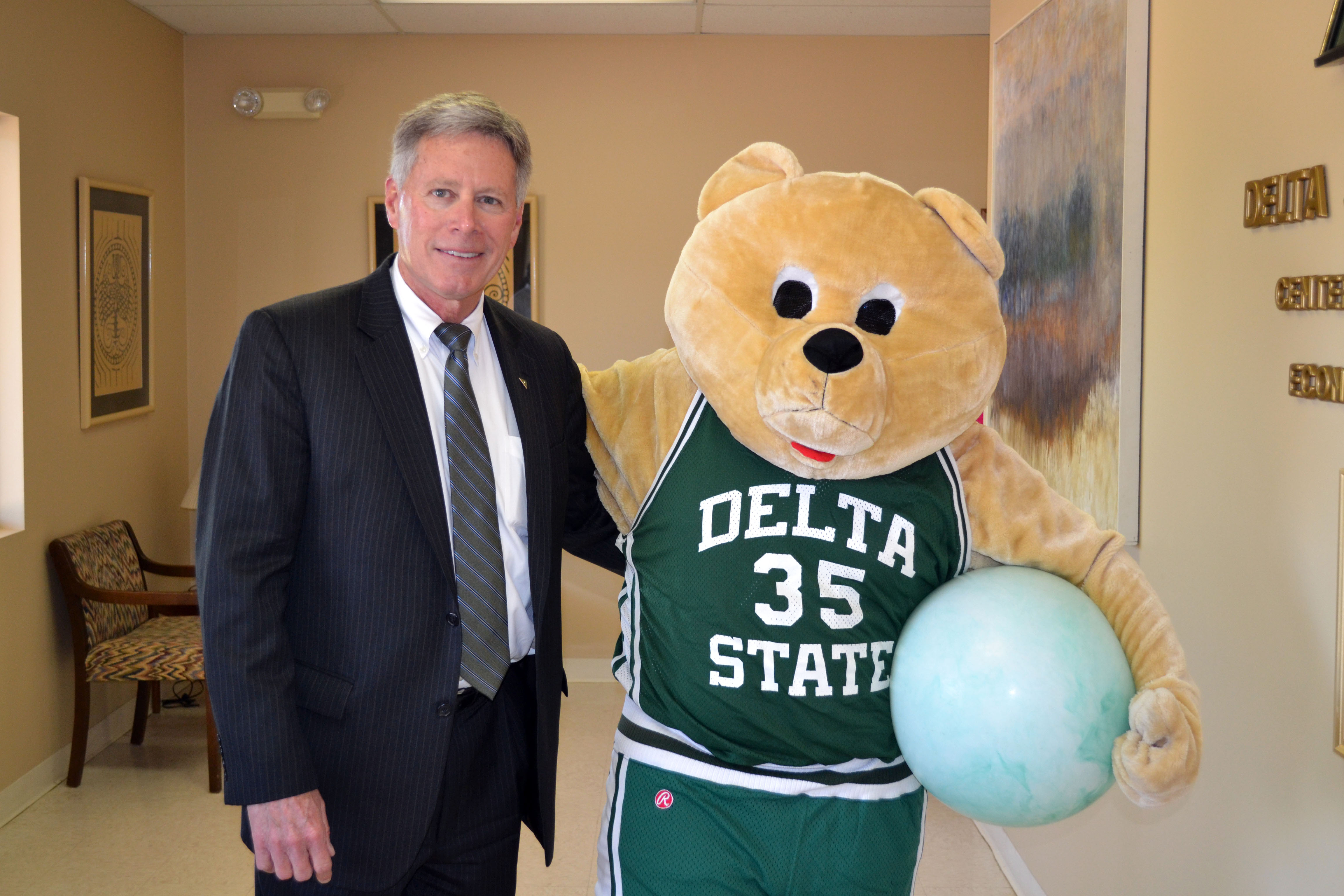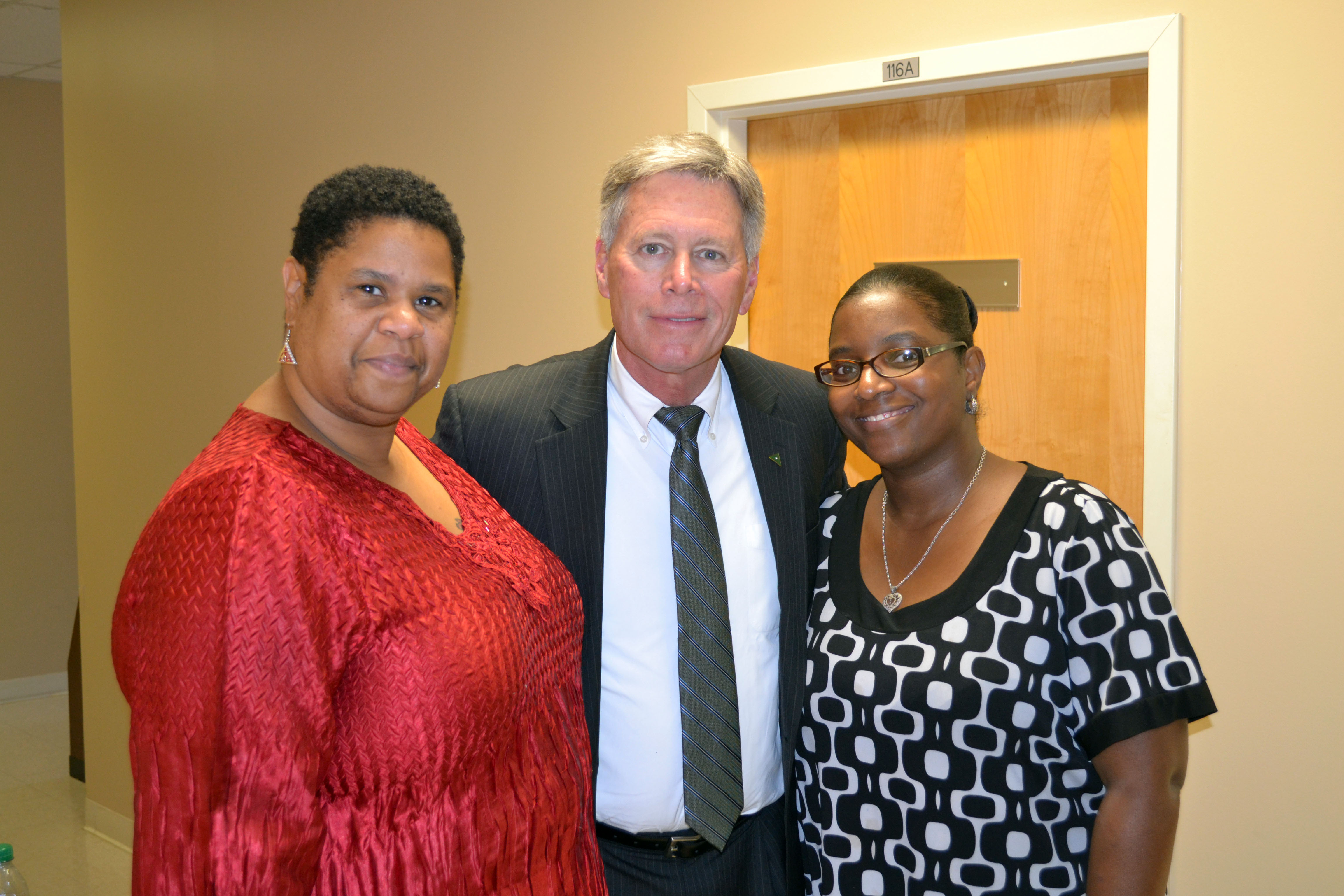
The directors of the Center for Community and Economic Development (CCED) discussed success, shortcomings, and community relationships with Delta State President LaForge. CCED is an extension of Delta State that directs AmeriCorps members and helps promote the surrounding communities by utilizing four departments: America Read Mississippi (ARM), School-based Asthma Management (SAM), Breast Education Early-detection Project (BEEP), and VISTA.
“If we are going to be partners, I do not want us to be mediocre. We will be great. We will be leaders in this community,” said LaForge.
LaForge toured the facility and spoke with the directors together and individually about each department.
“I want Delta State to be a leader in this community and this facility has to be a vital outreach tool. We know our primary mission, but the secondary has to include community outreach, child development, education, poverty, and healthcare. ” said LaForge.
LaForge met with Delta State Regional Coordinator of America Reads Mississippi Carla Ross and retiring Administrative Assistant Lestine Rogers. The ARM program focuses on the literacy level of K-3rd grade children by tutoring them one-on-one. Delta State is the largest branch of ARM within the six participating universities that incorporate the community program.
Rogers commented that ARM members of AmeriCorps tutor students in need and serve as mentors in their personal lives. Delta State’s ARM members assist operations in 14 school districts with typical results of students raising their reading level by two grades.
When asked about the employment rates of the ARM members, Ross stated, “The schools are very receptive to this program and offer jobs to those who stay and tutor.”
LaForge also spent time with the School-based Asthma Management division. SAM operates within 14 counties, 31 school districts, and currently has 80,000 students enrolled in the program.
Program Director Judith Winford and Health Advocacy Coordinator Marquita Dorsey informed the president that SAM’s primary role is to close the gap between schools, parents, educational information, and pharmaceutical companies.
“Asthma is the leading reason for school absences in the nation,” said Winford.
In an effort to increase asthma awareness, SAM focuses on counseling families on topics such as the dangers of untreated asthma, medication, medical side effects, primary care, and asthma triggers. SAM does not collect identification data; therefore, the program functions as an interphase to make sure diagnosed school children have an ‘Asthma Action’ plan in place.
Most triggers for asthma-stricken children are results of living on or near farms or industrial sites. Other high asthma rates can be found linking with obesity, poverty, and air quality.
The SAM program uses a furry and friendly mascot, Wheezy the Bear, when visiting schools to talk about asthma.
LaForge discussed the Breast Education Early-detection Project with Program Coordinator Alfreda Cowins and VISTA Member Taneisha Jackson. BEEP actively operates within Bolivar, Sunflower, and Washington counties to help women who are poverty-stricken and uninsured.
“The community has been very involved in BEEP. Whether it is attending Pink-Out basketball games in the coliseum, helping plan community outreach programs in October, or sponsoring runs and walks, the community has completely embraced this program,” stated Cowins.
BEEP has been successful in gaining three doctors who volunteer their expertise to screen for breast cancer during events. Through grant funding, the first initial screening is covered in full. The newest challenge right now is getting more women (and men) over 40 years old to participate. For those that have attended previously, they are placed in a system that helps BEEP remind them to come back for annual screenings.
Cowins also commented that due to the participation of Delta State University’s Greek organizations, the Robert E. Smith School of Nursing, and the faculty, all the program needs is more advocates.
LaForge completed his tour with a meeting with VISTA Director Linda Stringfellow. AmeriCorps VISTA program stands for Volunteers in Service to America. On July 27, the program will celebrate a decade of commitment and federal funding while being on Delta State’s campus.
VISTA offers volunteers an array of internships and work-study opportunities throughout all four programs at CCED. Currently, members are able to help citizens in the community through the 18 partnerships participating in the program. One guideline is that VISTA members rotate out every 2-3 years.
“We have a three year serving limit for volunteers. This helps the program bring in new people and swap out the experienced ones so that they can move permanently into a project area,” said Stringfellow.
According to pamphlets and general information, VISTA tries to serve the smaller communities first because they are often overlooked.
“Our main focuses are on high school drop-out prevention and getting graduates to continue towards college,” added Stringfellow.
Some of the more recent AmeriCorps and Delta State partnerships that have been highly successful include Crayons to Careers, Rock the Red, and Stuff the Bus. Once VISTA establishes a signature project and the community gets on board, the project is turned over to an organization to continue. The department hopes to turn over the annual project, Stuff the Bus, next.



